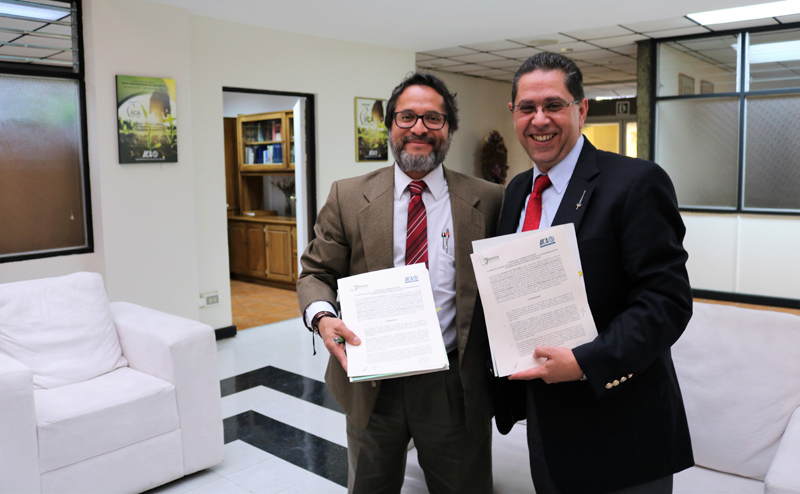As the result of a partnership with the Institute, Costa Rica’s National Animal Health Service (SENASA) will benefit from a computer tool that will strengthen the inspection, control and surveillance processes of facilities that prepare products for human consumption.

San Jose, 1st March 2018 (IICA). A technical cooperation agreement between the Inter-American Institute for Cooperation on Agriculture (IICA) and the National Animal Health Service (SENASA) of Costa Rica will allow for creating a computer system to monitor the inspection, control and supervision processes of facilities in Costa Rica that prepare food of animal origin for human consumption. This, in turn, will contribute to guaranteeing a safer, healthier supply of these types of products in the country as well as in the international markets where there are commercialized.
The two-year partnership was signed by Miguel Ángel Arvelo, IICA Representative in Costa Rica, and Bernardo Jaén, Director General of SENASA.
The agreement’s main initiative will be an online computer system with an application for mobile devices, which will provide users at SENASA with a timely and reliable platform for the registration, control and monitoring of facility inspections, causes of confiscations in slaughterhouses, and official sampling by the National Residues Plan, thus strengthening the work currently carried out by this entity.
“Guaranteeing food safety is a responsibility shared by different sectors. Therefore, access to reliable tools that facilitate the monitoring of control processes for food of animal origin in different facilities will contribute to strengthening the work carried out by SENASA in this area, thus rendering the Costa Rican livestock sector more competitive,” stated Arvelo.
The project will become a reality thanks to financial support from the Standards and Trade Development Facility (STDF), which provides funding for actions that promote compliance with sanitary and phytosanitary international standards.
“In recent years, SENASA has promoted and supported the implementation of computer tools that provide government institutions, producers, users, consumers and health authorities of trade partner countries with access to accurate information in real time, thus creating a transparent, versatile process that fosters greater competitiveness in sanitary and phytosanitary matters,” stated Jaén.
Eventually, this control system could be adapted or implemented by other countries in the region, to take advantage of the benefits afforded by technological tools in terms of access to information. In this way, users will be able to contribute to current efforts to standardize sanitary and phytosanitary requirements, through the creation of Central American Technical Regulations and early warning computer systems.
More information:
Sacha Trelles, Specialist in Agricultural Health and Food Safety of the IICA Delegation in Costa Rica











